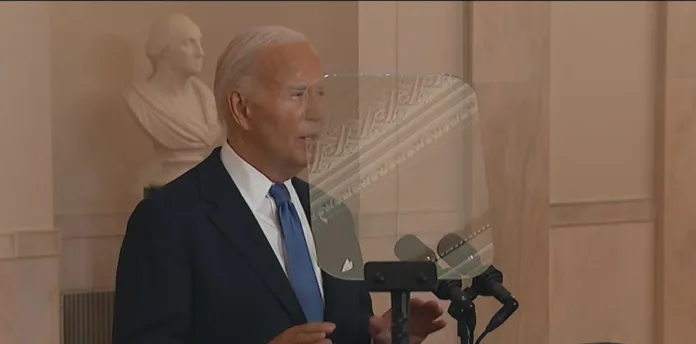Biden condemns Supreme Court decision allowing presidential immunity, calling it a threat to democracy, while Trump celebrates a major legal victory
President Joe Biden has strongly criticized a recent U.S. Supreme Court ruling that grants former presidents immunity from criminal prosecution for official acts performed while in office. Speaking from the White House, Biden asserted that this decision undermines the foundational principle that “there are no kings in America,” warning that it effectively allows the president to “ignore the law.”
The Supreme Court’s ruling, which passed with the support of the three conservative justices appointed by former President Donald Trump, establishes that while presidents are immune from criminal prosecution for official actions, this immunity does not extend to unofficial acts. This decision represents a significant victory for Trump, who faces accusations of attempting to overturn the results of the 2020 election.
“Each of us is equal before the law. No one is above the law, not even the president of the United States,” Biden emphasized during his address. He expressed concern that the ruling enables any president, including Trump, to evade legal accountability.
Although the Supreme Court did not directly address the merits of Trump’s case, it remanded the matter to a lower court to determine whether Trump’s actions were official or private in nature. This legal distinction will be crucial in deciding Trump’s potential prosecution.
In his reaction to the ruling, Trump celebrated it as a significant triumph for American democracy. He posted online, “BIG WIN FOR OUR CONSTITUTION AND DEMOCRACY. PROUD TO BE AN AMERICAN!” The decision is seen as pivotal to Trump’s future legal battles, potentially preventing him from facing trial before the upcoming presidential election in four months.
During a press conference, Biden expressed his disappointment with the ruling, describing it as a “terrible disservice to the people of this nation.” He noted that if Trump were to be re-elected, he could potentially use his presidential powers to dismiss the charges against him.
The ruling has sparked a fierce debate among legal experts and politicians. Chief Justice John Roberts defended the decision, stating that presidents have “at least presumptive immunity from prosecution” for official acts. However, the court’s three liberal justices dissented, with Justice Sonia Sotomayor warning that the ruling sets a dangerous precedent for democracy. She argued that it effectively makes the president a “king above the law.”
Biden’s remarks come in the wake of a poor performance in a recent debate with Trump, which has led to speculation about his viability as the Democratic candidate. Despite the criticism, Biden’s family and supporters have urged him to continue his campaign.
Analysis
Political: Politically, the Supreme Court’s ruling on presidential immunity has far-reaching implications. It strengthens the legal protections for sitting and former presidents, potentially reshaping the balance of power between the executive branch and the judiciary. This decision could embolden future presidents to exercise their powers more aggressively, knowing they have substantial legal immunity for their official actions. The ruling may also become a contentious issue in the upcoming presidential election, with candidates and lawmakers debating the boundaries of executive power and accountability.
Social: Socially, the ruling has sparked widespread debate about the principles of equality and justice in America. Many citizens fear that granting presidents immunity from prosecution undermines the notion that no one is above the law. This decision may lead to increased public scrutiny of presidential actions and a demand for greater transparency and accountability. The ruling could also influence societal attitudes towards the legal system and governance, potentially eroding trust in democratic institutions if people perceive that leaders are not held accountable for their actions.
Racial: Racially, the decision has implications for marginalized communities who have historically fought for equal treatment under the law. Critics argue that this ruling could exacerbate feelings of injustice and inequality, particularly if it is perceived that powerful individuals are shielded from accountability. The ruling may also influence the broader conversation about systemic inequalities within the legal system, prompting renewed calls for reforms to ensure that all individuals, regardless of their status, are subject to the same legal standards.
Gender: From a gender perspective, the ruling could impact efforts to address gender-based inequalities in leadership and governance. If the perception grows that male leaders, who have predominantly occupied the presidency, are granted immunity from prosecution, it could reinforce existing gender biases and barriers for women aspiring to political office. The ruling may also influence public discourse on gender and power, highlighting the need for inclusive and equitable legal frameworks that hold all leaders accountable regardless of gender.
Economical: Economically, the Supreme Court’s decision could have significant repercussions. By potentially shielding presidents from legal consequences, the ruling may affect the stability and predictability of governance, which in turn could impact economic confidence and investment. Businesses and investors rely on a stable legal and political environment to make informed decisions. Any perception of increased political instability or unchecked executive power could lead to economic uncertainty. Additionally, the ruling might influence future economic policies if presidents feel empowered to take more unilateral actions without fear of legal repercussions.
